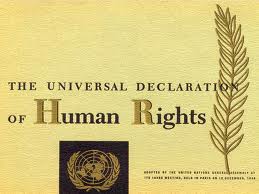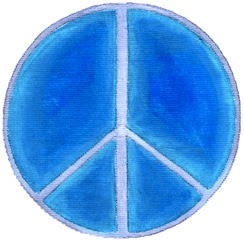 I’d like to give my personal view of some relationships among peace, human rights, and universal law.
I’d like to give my personal view of some relationships among peace, human rights, and universal law.
I base my opinion on human rights on the experience of being a human-rights decision maker – a refugee adjudicator for the Immigration and Refugee Board of Canada – for eight years.
I base my opinion on peace on the experiences of peace that I’ve had; on universal law, on the teachings of the Company of Heaven. (1)
For me, peace is a soul condition, a transcendent state, a condition that arises from a dimension beyond bodies and forms.
It sees the mind become utterly still. Nothing stirs – not a thought or desire. There are no waves (vrittis) in the mind. No candle flickers in this windless place.
Surprisingly, when I was in that state on two occasions, I felt as solid as granite. You’d think I’d feel buoyant. But I didn’t. I felt substantial, grounded.
I’ve never felt so much at home as I did in that state. There was just me, with nothing added and nothing taken away.
***
That’s peace for me. My experiences of peace, I believe, were realized knowledge at the level of transformation, but not at the level of transcendence.
Transformative on the one hand means the realization in question propelled me from a state of unconscious awareness to one of conscious awareness. But it didn’t alter my dimensionality.
Transcendental on the other hand – as the term is used in terrestrial enlightenment literature – refers to a more evolved level of realization than the transformative. In it, form is left behind and one realizes formlessness, beyond the twelve dimensions.
Our first taste of the transcendental comes still within the Third Dimension, with seventh-chakra enlightenment (Brahmajnana, God-Realization). That is not the culminating event of Ascension, which is Sahaja Samadhi. Thus even Brahmajnana is not enough to propel us from the 3rd/4th Dimension to the 5th.
Any taste of the transcendental far exceeds the bliss of the transformative.
Peace then is the goal we’re aiming for and this, for me, is what peace consists of. We go deeper and deeper into peace as our higher dimensionality unfolds.
***
That’s what I mean by “peace.”
Turning to human rights, they’re the mechanisms we use to attain a peaceful balance in society among citizens making demands of each other. Human rights are the mechanisms used to equitably keep the peace in society.
They’re the mechanism we use to ensure that no one is bullied into submission, threatened with violence, or in other ways persecuted in our world. They ensure the freedom of some by denying freedom to others. They deny freedom to those who would harm in the name of those whom they would harm.
They’re founded in fairness and equality, which are themselves qualities associated with the center, the middle, the heart.
***
But human rights are at best a pale reflection of universal law. Universal law doesn’t supplant the need for human rights, but it deepens the meaning, relevance, and impact of them.
Universal law enhances the clarity and focus of human rights. Universal law describes how the universe actually works.
The law of freewill can offer an example. It holds that everyone’s right to freedom of choice shall be honored except where harm will result.
If we violate the freewill of others, a second universal law – the law of cause and effect – is triggered. It ensures that the harm we visit on others will be visited on us – so that we learn the consequences of our actions and what those consequential states feel like.
What went around usually comes around only in a future lifetime, but it does see that we experience what we’ve had others experience at our hands.
Human rights are enforceable by the agencies of state protection. Universal laws are self-enforcing. They need no agencies, no arms of the law, no courts of justice.
Often justice does not prevail or not fully prevail in human courts. But justice always prevails to the letter in the workings of the universal law.
***
When human-rights bodies and agencies base their human-rights legislation on universal law the same way they base them now on a treaty or charter, then, I think, we’ll be building human rights on a foundation of rock instead of the sand we build on at present.
At present the human-rights domain is subject to the political. Human-rights decision makers can be biased by political pressure, with threat of job loss for non-conformity. Human-rights programs can be starved of funds by governments who don’t support them.
We’ve seen a tremendous retreat in the whole domain of human rights since at least 9/11. All of it was in my opinion intentional – an intentional retreat from an order that respected human rights to one that routinely violated and tried to shrink them.
There’s no retreat in the honoring of universal law. One cannot even contemplate universal law, I think, as long as one remains loyal to hatred, violence, and warfare.
Nonetheless, there are those among us who have the ability to rewrite the human-rights cornerstone declarations, for a New Age, based on the relevant universal laws, most prominent among them the law of freewill.
This is something, as Kathleen has pointed out, that does not need to wait for the Reval.
Footnotes
(1) The Company of Heaven comprises the Divine Mother, the angelics, galactic ascended masters, and terrestrial ascended masters. What they share in common is that they convey their messages by way of channeled communications.


